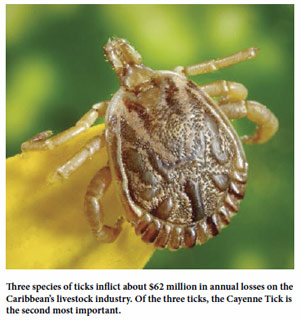 |
 |
 |
|
June 2015 |
Professor Basu has made parasites his life’s work. On May 21, he shared insights at his inaugural lecture as Professor titled “A Journey with Parasites – Focusing Concern, Control, and Eradication in Tropical Regions.” Professor Basu currently heads the Department of Basic Veterinary Sciences and is a Professor in Veterinary Parasitology in the Department of Basic Veterinary Sciences of the Faculty of Medical Sciences. He believes that nothing short of a thorough knowledge of various aspects of parasites is needed to combat them effectively. This knowledge, he asserts, must include their epidemiology, biology, bionomics, life cycle, and treatment. The Professor revealed that globally, some of the more deadly parasites include Onchocerca volvulus (a filarial parasitic nematode) which causes river blindness among people in sub-Saharan Africa, the Middle East, and South and Central America. It’s estimated that about 25 million people are infected with river blindness worldwide; one million of them become blind. Veterinarians, livestock farmers, and persons who keep domestic pets will be familiar with ticks. Professor Basu described these parasites as fascinating because of their considerable medical and veterinary importance. Ticks are essentially blood-sucking obligatory ectoparasites (they live on the outside of their hosts) of mammals, birds, reptiles, and amphibians. They give rise to anaemia, decreased milk production, paralysis, and irritation from bites. Globally, annual losses as a result of ticks are estimated to be between US$ 13.9 billion and US$ 18.7 billion. Professor Basu has spent time studying the three species of ticks that do the most damage to Caribbean livestock. Born in India, Professor Basu joined The UWI in 2008 as a lecturer. During his time, he has been active in community service and has helped to treat with parasites in broiler chickens, sheep, goats, dogs, and swine. |

 The Caribbean livestock industry experiences losses to the tune of US$62 million, as a result of parasites like ticks. Parasites affect both humans and animals. Some parasites are relatively harmless; others can produce pathological changes which lead to severe health problems and even death says Professor Asoke Basu of The UWI, St. Augustine Campus.
The Caribbean livestock industry experiences losses to the tune of US$62 million, as a result of parasites like ticks. Parasites affect both humans and animals. Some parasites are relatively harmless; others can produce pathological changes which lead to severe health problems and even death says Professor Asoke Basu of The UWI, St. Augustine Campus.